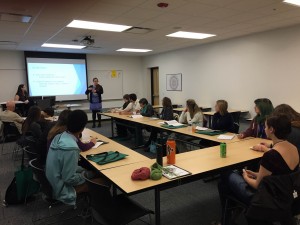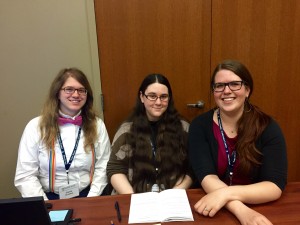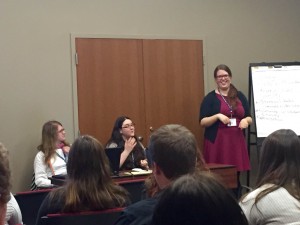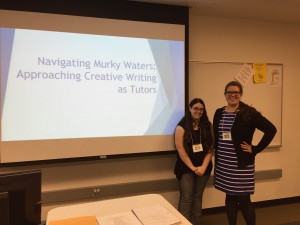 Writing center practice and theory, as a discipline, is one of the most inclusive and supportive academic communities that I’ve had the opportunity to be a part of. One particular quality of writing center practice is how much it supports and encourages student scholarship. The governing organization for writing centers, the International Writing Center Association (IWCA), has three publications. One of them, WLN, always features articles by undergraduate tutors and another brand new publication, The Peer Review, is centered entirely around the publication of scholarly articles by high school, undergraduate, and graduate tutors. During the most recent IWCA conference, I witnessed undergraduate tutors collaborating with scholars the likes of Les Perelman (a leading composition scholar) and Muriel Harris (one of the first writing center directors in the country).
Writing center practice and theory, as a discipline, is one of the most inclusive and supportive academic communities that I’ve had the opportunity to be a part of. One particular quality of writing center practice is how much it supports and encourages student scholarship. The governing organization for writing centers, the International Writing Center Association (IWCA), has three publications. One of them, WLN, always features articles by undergraduate tutors and another brand new publication, The Peer Review, is centered entirely around the publication of scholarly articles by high school, undergraduate, and graduate tutors. During the most recent IWCA conference, I witnessed undergraduate tutors collaborating with scholars the likes of Les Perelman (a leading composition scholar) and Muriel Harris (one of the first writing center directors in the country).
 In the Writing and Reading Center (WRC), our Readers also participate in this scholarship. We attend an average of three conferences per year, ranging from statewide to international, and present at at least one conference per year. These presentations are entirely generated, proposed, and created by Readers from the WRC, who present formally for anywhere from 20 to 75 minutes. During these presentations, they are citing research from the field and experiences at NMC, while promoting audience interaction and discussion. They are treated as equals within the field, if not more, due to their day-to-day interactions with the students we teach.
In the Writing and Reading Center (WRC), our Readers also participate in this scholarship. We attend an average of three conferences per year, ranging from statewide to international, and present at at least one conference per year. These presentations are entirely generated, proposed, and created by Readers from the WRC, who present formally for anywhere from 20 to 75 minutes. During these presentations, they are citing research from the field and experiences at NMC, while promoting audience interaction and discussion. They are treated as equals within the field, if not more, due to their day-to-day interactions with the students we teach.
 At the same time that their contributions are treated as valuable, the field of writing centers also embraces these opportunities to train up new scholars within the field. Both attending conferences and publishing articles helps illustrate to emerging professionals what it means to be a part of a larger community. They learn about research strategies and academic discourse as they create professional identities for themselves.
At the same time that their contributions are treated as valuable, the field of writing centers also embraces these opportunities to train up new scholars within the field. Both attending conferences and publishing articles helps illustrate to emerging professionals what it means to be a part of a larger community. They learn about research strategies and academic discourse as they create professional identities for themselves.
 Two weeks ago two WRC Readers, Kristy Groth and Erica Smith, presented at the Michigan Writing Centers Association Conference about creative writing in writing centers and how writing centers can support both their tutors and their students with creative writing projects. Following the presentation they had long talks with both tutors and directors from around the state, who complimented them on their presentation and discussed ideas they surfaced. Erica then presented at the October 26th Board of Trustees meeting about the benefits that these opportunities have afforded her, especially as a future teacher. (See the full video here. The WRC services presentation begins at 17:25. Erica’s section begins at 33:10.) It is so fulfilling to see my employees growing into their roles as future academic voices, interacting with their peers and contributing to the greater conversations around us. This is education in action.
Two weeks ago two WRC Readers, Kristy Groth and Erica Smith, presented at the Michigan Writing Centers Association Conference about creative writing in writing centers and how writing centers can support both their tutors and their students with creative writing projects. Following the presentation they had long talks with both tutors and directors from around the state, who complimented them on their presentation and discussed ideas they surfaced. Erica then presented at the October 26th Board of Trustees meeting about the benefits that these opportunities have afforded her, especially as a future teacher. (See the full video here. The WRC services presentation begins at 17:25. Erica’s section begins at 33:10.) It is so fulfilling to see my employees growing into their roles as future academic voices, interacting with their peers and contributing to the greater conversations around us. This is education in action.

